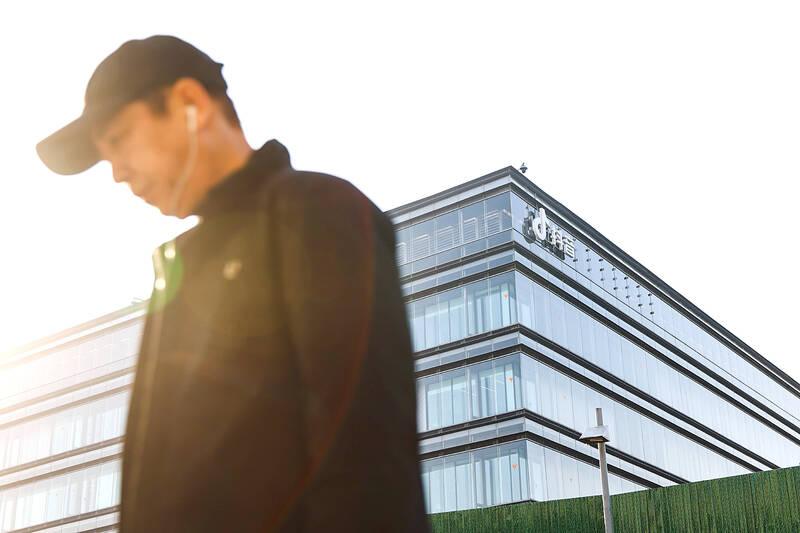TikTok’s expected shutdown today poses the biggest threat to the universe of small and medium-sized firms and so-called influencers who depend on the short-form video site for their livelihood, while big brands are expected to move to other sites.
TikTok said its US site generates billions for businesses selling candies, beauty products, clothes and other consumer goods, but that economy is under threat. The US Supreme Court on Friday unanimously upheld the law banning TikTok in the US on national security grounds ahead of a blackout this weekend.
After the ruling, US president-elect Donald Trump, who takes office tomorrow, said he would make a decision on TikTok, without providing details.

Photo: AFP
As a marketing tool for businesses, ByteDance Ltd’s (字節跳動) TikTok generates revenue for itself, and for many of its users and merchants, through sponsorships and by collecting fees on sales.
Many TikTok users are paid to be brand ambassadors for companies, selling merchandise and affiliate partnerships where users are paid commissions by companies when audiences purchase items linked on their social profiles. TikTok also compensates some creators for making videos.
Those who receive revenue from TikTok also include start-ups, consumer companies and bloggers cashing in on the platform’s massive reach of up to 170 million Americans.

Photo: EPA-EFE
For example, small and medium-sized food and beverage businesses, the revenue of which increased by US$4.1 billion in 2023 from marketing and advertising on the app, stand to lose the most, estimates by economic advisory firm Oxford Economics showed.
That data was commissioned by TikTok.
TikTok CEO Chew Shou Zi (周受資) said in a video posted to the app on Friday that 7 million US businesses earn a living on the platform.
For Mama V’s Candy, the e-commerce arm of Bytedance’s video platform, the TikTok Shop, changed the trajectory of the business, owner Valerie Verzwyvelt said.
“We have pretty much stayed viral since the beginning of the TikTok Shop launch last year,” Verzwyvelt said.
The company, which sells extremely sour candies, made US$6 million last year and has sold nearly 300,000 units on the app, she said.
“We are on our second expansion,” she said, a decision the Pineville, Louisiana-based company made before the reality of today’s deadline set in. “I have to rebuild my business now.”
Sven Greany, co-owner of California-based independent beauty brand Simply Mandys, said that a TikTok ban would bring his business to a “screeching halt” after a record holiday shopping season.
Simply Mandys made more than US$20 million in sales last year on the TikTok Shop with the help of livestreaming.
Greany said he never fretted about the app’s ties to China, adding that 95 percent of the company’s total sales come from shoppers on the platform.
However, the company has plans to shift its marketing to Meta Platforms Inc’s Instagram once TikTok is no longer available, but TikTok’s privacy policy blocks sellers from accessing shopper e-mails, addresses and other information that could be useful for marketing outside of the platform.
Essentially, if TikTok disappears, so do Simply Mandys’ customers, Greany said.
Other businesses are holding sales and dropping prices to clear out inventory in the event that traffic to their shops comes to an abrupt end today.
That is not stopping some influencers from recommending products as they look to cash out ahead of the ban.
“These TikTok shops are mass ‘clearancing’ their products in anticipation of the ban, so I’m linking some clearance products that I love for skincare,” one user told her 65,000 followers.
Beyond commissions, a TikTok influencer with 10,000 to 100,000 followers can potentially earn US$2,000 per brand campaign, Lithuania-based influencer marketing agency Billo said.
For some of TikTok’s top US creators, the entirety of their income would come to a halt, while the major companies they have partnered with pivot to other platforms, such as YouTube or Instagram.
Oxford Economics said that small and medium-business-activity on TikTok contributed US$24.2 billion, or a small sliver of overall US GDP in 2023, while supporting 224,000 jobs. Reuters could not independently verify those estimates.
Yuriy Boykiv, chief executive of e-commerce consultancy Front Row, said his clients made contingency plans to shift their marketing spending to other platforms that have similar short-form videos such as Instagram and YouTube.
“Every client has known about this possibility of TikTok going away since April of 2024, so everybody has done some preparation,” Boykiv said.
Front Row’s clients include Procter & Gamble Co’s haircare brand Ouai and LVMH Moet Hennessy Louis Vuitton SE’s Sephora, according to its Web site.
“We go where our community is and right now that includes TikTok. If they shift to other platforms in the future, we’ll be right there with them,” Kory Marchisotto, chief marketing officer at e.l.f. Beauty Inc, said in a statement.
Mitchell Halliday, the founder and creative director of British beauty brand Made By Mitchell, which launched on the TikTok Shop in the US at the end of August last year, started selling on the shop in the UK in 2022 and became the first British beauty brand to hit US$1 million in sales in one day on the platform.
“TikTok is the hub of beauty nowadays. It used to be YouTube, then it was Instagram, and now it is TikTok,” Halliday said.

CAUTIOUS RECOVERY: While the manufacturing sector returned to growth amid the US-China trade truce, firms remain wary as uncertainty clouds the outlook, the CIER said The local manufacturing sector returned to expansion last month, as the official purchasing managers’ index (PMI) rose 2.1 points to 51.0, driven by a temporary easing in US-China trade tensions, the Chung-Hua Institution for Economic Research (CIER, 中華經濟研究院) said yesterday. The PMI gauges the health of the manufacturing industry, with readings above 50 indicating expansion and those below 50 signaling contraction. “Firms are not as pessimistic as they were in April, but they remain far from optimistic,” CIER president Lien Hsien-ming (連賢明) said at a news conference. The full impact of US tariff decisions is unlikely to become clear until later this month

With an approval rating of just two percent, Peruvian President Dina Boluarte might be the world’s most unpopular leader, according to pollsters. Protests greeted her rise to power 29 months ago, and have marked her entire term — joined by assorted scandals, investigations, controversies and a surge in gang violence. The 63-year-old is the target of a dozen probes, including for her alleged failure to declare gifts of luxury jewels and watches, a scandal inevitably dubbed “Rolexgate.” She is also under the microscope for a two-week undeclared absence for nose surgery — which she insists was medical, not cosmetic — and is

GROWING CONCERN: Some senior Trump administration officials opposed the UAE expansion over fears that another TSMC project could jeopardize its US investment Taiwan Semiconductor Manufacturing Co (TSMC, 台積電) is evaluating building an advanced production facility in the United Arab Emirates (UAE) and has discussed the possibility with officials in US President Donald Trump’s administration, people familiar with the matter said, in a potentially major bet on the Middle East that would only come to fruition with Washington’s approval. The company has had multiple meetings in the past few months with US Special Envoy to the Middle East Steve Witkoff and officials from MGX, an influential investment vehicle overseen by the UAE president’s brother, the people said. The conversations are a continuation of talks that

CHIP DUTIES: TSMC said it voiced its concerns to Washington about tariffs, telling the US commerce department that it wants ‘fair treatment’ to protect its competitiveness Taiwan Semiconductor Manufacturing Co (TSMC, 台積電) yesterday reiterated robust business prospects for this year as strong artificial intelligence (AI) chip demand from Nvidia Corp and other customers would absorb the impacts of US tariffs. “The impact of tariffs would be indirect, as the custom tax is the importers’ responsibility, not the exporters,” TSMC chairman and chief executive officer C.C. Wei (魏哲家) said at the chipmaker’s annual shareholders’ meeting in Hsinchu City. TSMC’s business could be affected if people become reluctant to buy electronics due to inflated prices, Wei said. In addition, the chipmaker has voiced its concern to the US Department of Commerce